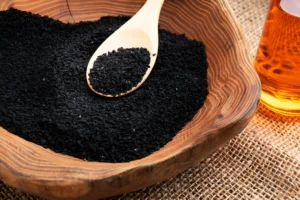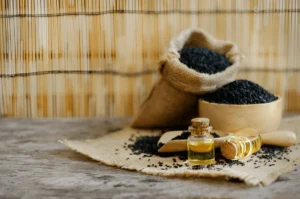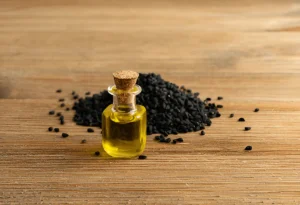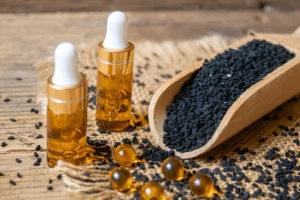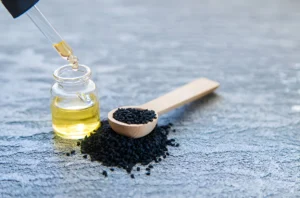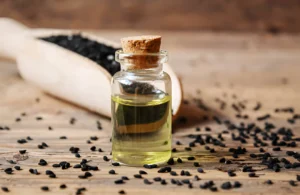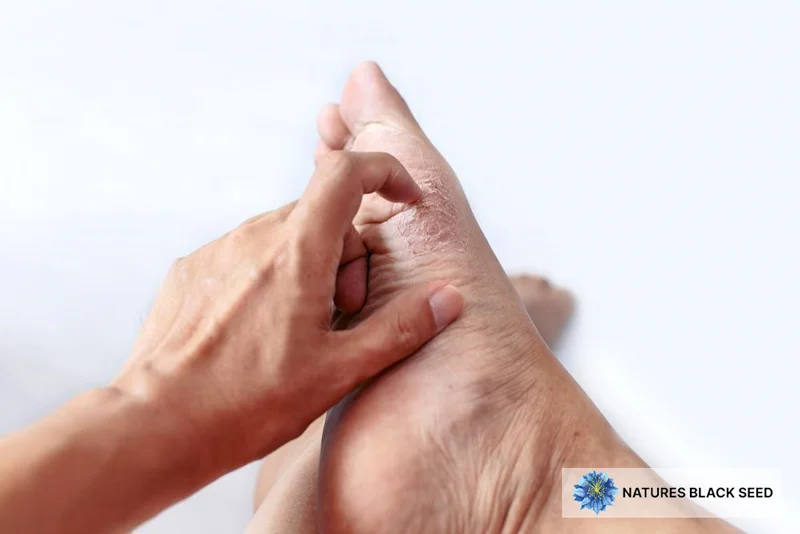 black seed oil foot fungus psoriasis
black seed oil foot fungus psoriasisUnderstand about Foot Fungus and Fungal Infections
Fungal infections are caused when fungi, like dermatophytes or yeast, infect the skin and feed in warm, moist conditions such as shoes or locker rooms. Athlete’s foot is the most common variety of fungus infection, but it can also spread to affect nails or even other parts of the body. Risk factors include poor hygiene, over-activity causing sweating, as well as wearing improper fitting and improperly ventilated footwear.
Symptoms of Foot Fungus:
- Itching and Burning: Intense and persistent itching and burning sensation in the soles that is concentrated between the toes.
- Scaling and Cracking: Dry peeling or flakiness of the skin which eventually leads to cracks.
- Discoloration and Thickening of Nails: In severe cases, the infection can spread to the nails, making it yellow, brittle, or thick.
Fungal infections are resilient and can be challenging to eliminate. Topical creams and oral medications are common treatments, but natural remedies like black seed oil for foot fungus are gaining attention for their potent ability to effectively address symptoms and support skin healing.
The Role of Black Seed Oil in Killing Foot Fungus and Combating Fungal Infections
Originating from Nigella sativa seeds, black seed oil has long been prized for its therapeutic qualities, especially in Asia and the Middle East. Black seed oil’s high composition of bioactive chemicals makes it a powerful natural cure for foot fungus and other fungal illnesses. Here’s an explanation of how this special oil helps treat fungal infections by addressing them at the cellular level.
Activity of Antimicrobials Against Fungal Pathogens
Black seed oil plays a critical role in treating fungal infections, particularly black seed oil foot fungus, due to its potent antimicrobial properties. The main active component of black seed oil, thymoquinone, has shown potent antifungal properties that prevent the growth of common fungus like Candida albicans and Trichophyton rubrum, which are both commonly associated with foot infections. Thymoquinone efficiently stops the course of infections by interfering with the growth and dissemination of fungal organisms by attacking their cell walls. Because fungal colonies frequently withstand traditional treatments, this antifungal effect is particularly beneficial for chronic illnesses like athlete’s foot.
Reducing Inflammation to Alleviate Symptoms
Foot fungus infections, particularly advanced cases, result in inflammation, redness, and itching. Black seed oil’s anti-inflammatory properties come into play here. Thymoquinone and other compounds reduce inflammation at the infection site, alleviating the painful and uncomfortable symptoms commonly associated with fungal infections. This soothing effect makes black seed oil foot fungus not just a remedy for the infection itself but also for the discomfort that accompanies it. This dual role of treating both the fungal cause and the inflammatory symptoms allows black seed oil to serve as a comprehensive approach to managing foot fungus naturally.
Support for Skin Healing and Repair
Black seed oil promotes skin repair and regeneration, addressing not just the infection but also the skin damage caused by foot fungus. When fungal infections lead to cracked, rough, or damaged skin, black seed oil’s nourishing compounds, including essential fatty acids, play a crucial role in restoring skin integrity. Omega-3, -6, and -9 fatty acids in black seed oil strengthen the skin’s natural barrier, while vitamin E nourishes and accelerates the healing process. This rejuvenating effect is especially beneficial when fungal infections have caused significant skin damage, providing the support necessary to restore the skin’s health and protective properties.
Prevention of Future Fungal Growth
Black seed oil’s natural antifungal and antibacterial properties make it an effective tool not only for treating existing infections but also for creating a protective barrier that helps prevent future fungal growth. Regular use of black seed oil disrupts the conditions fungi need to thrive, reducing the likelihood of recurrent foot fungus. By incorporating black seed oil into a preventive foot care routine, individuals prone to fungal infections can safeguard against future outbreaks and maintain healthier skin.
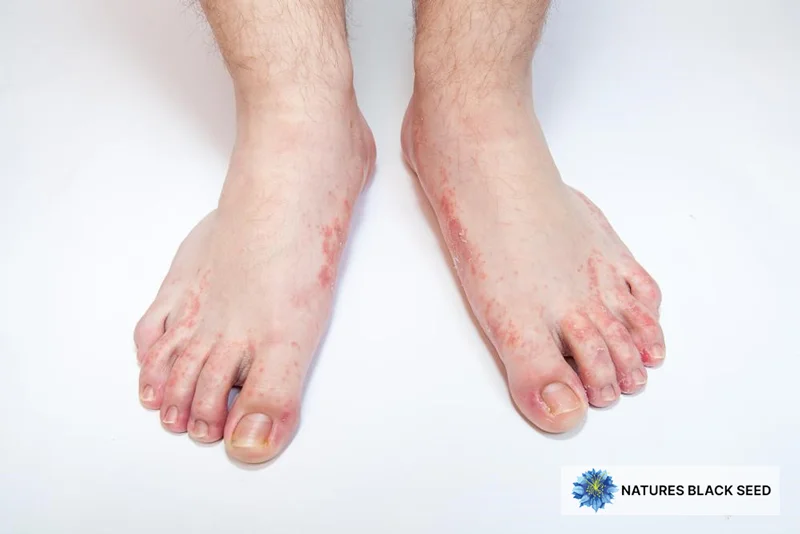 black seed oil for foot fungus
black seed oil for foot fungusBlack Seed Oil Benefits for Fungal Infection
Black seed oil has long been valued for its powerful healing properties, especially in the treatment and prevention of fungal infections. Packed with a range of natural compounds, this versatile oil effectively addresses foot fungus and other common skin conditions. By leveraging its diverse benefits, black seed oil offers a natural and effective solution for promoting skin health and combating fungal growth.
Natural Antifungal Properties
Black seed oil treats fungal infections without the use of synthetic chemicals or pharmaceuticals. This makes it particularly appealing for those seeking gentle, plant-based solutions. Conventional antifungal medications can sometimes cause side effects like skin irritation, dryness, and allergic reactions. Black seed oil provides a safer alternative that reduces fungal presence without introducing unwanted side effects. This makes it suitable even for individuals with sensitive skin, who might otherwise react to stronger topical agents.
Moisturizing Effects for Dry, Cracked Skin
Fungal infections, especially those affecting the feet, often result in dry, cracked skin that further damages the skin’s health. Black seed oil helps address this issue by deeply moisturizing and nourishing the affected areas. Its essential fatty acids penetrate the skin layers to restore hydration and softness, improving comfort and supporting the healing of rough patches that commonly accompany fungal infections. This emollient action helps rejuvenate the skin’s texture, promoting a smoother, healthier appearance.
Improved Function of the Skin Barrier
The natural barrier of the skin is strengthened by black seed oil, increasing the skin’s resistance to fungus and environmental stresses. By making the environment unfriendly to fungus, black seed oil’s important fatty acids, antioxidants, and vitamins strengthen the skin against recurrent infections. For those who are regularly exposed to places like public pools, gyms, and locker rooms where fungal infections are prone to flourish, this skin-strengthening advantage is essential.
Symptom Management and Pain Reduction
Itching, swelling, and soreness are some of the most unpleasant signs of fungal infections that can be reduced by black seed oil’s anti-inflammatory and pain-relieving qualities. An efficient analgesic that relieves pain naturally is black seed oil. Because of this, it is particularly helpful for those who are coping with more severe or later stages of fungal infections, when the discomfort can be quite intense. Black seed oil’s anti-itch and pain-relieving properties help people with ailments like athlete’s foot feel better right away and more comfortably over time.
Enhancing Natural Skin Regeneration and Healing
By promoting the body’s natural healing processes, black seed oil foot fungus treatment can speed up recovery from fungal infections and minimize the appearance of scars or marks left by severe fungal outbreaks. Its high vitamin and mineral content contributes to cell turnover, allowing damaged skin cells to be replaced by new, healthy ones. This regenerative property is particularly beneficial for addressing discoloration or scars left by infections, ensuring that the skin heals with minimal visible damage.
Helps the Body Fight Off Fungal Infections Naturally
By strengthening the body’s defenses, regular usage of black seed oil increases the body’s ability to fight off illnesses and stop them from returning. Black seed oil lowers the chance of future breakouts by improving immune function overall, which not only helps treat existing fungal infections but also serves as a preventative strategy. For those who are prone to recurrent fungal diseases, this makes it a worthwhile, long-term remedy that will eventually result in healthier, more robust skin.
Scientific Validation of Black Seed Oil for Fungal Infections
Black seed oil’s medicinal promise in preventing fungal infections and enhancing skin health has been repeatedly demonstrated by scientific studies. Because thymoquinone, a potent ingredient in black seed oil, efficiently inhibits the development of fungi like Candida albicans and Trichophyton rubrum, which are major culprits in foot fungus, studies have demonstrated a tight relationship between black seed oil and foot fungus therapy. The antifungal effect of black seed oil was validated by a research that was published in the Journal of Ethnopharmacology, indicating that it might be used as a substitute therapy for infections that are resistant to other treatments. Black seed oil’s anti-inflammatory qualities are further supported by research published in the Phytotherapy Research Journal, which shows that it can lessen the redness and inflammation brought on by fungal infections. According to research published in the Journal of Cosmetic Dermatology, black seed oil promotes skin regeneration, repairs damaged skin, and enhances texture in general. These studies support black seed oil’s efficacy as a natural treatment for skin healing and fungal infections.
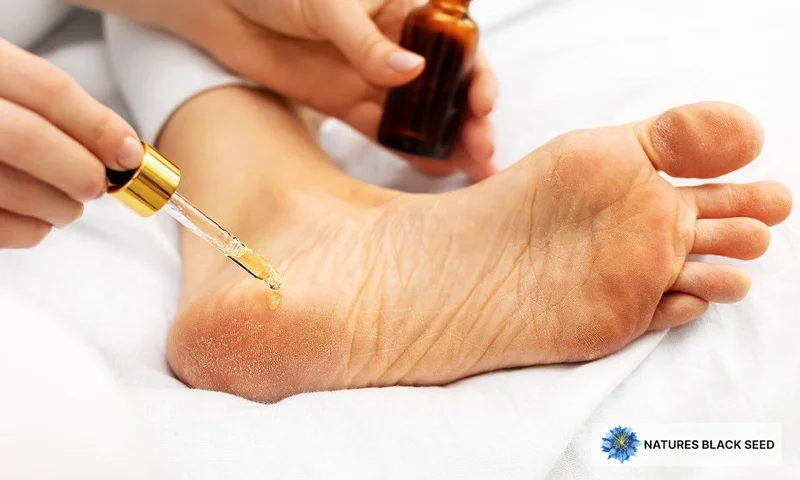 black seed oil and foot fungus
black seed oil and foot fungusHow to Use Black Seed Oil for Treating Foot Fungus
Incorporating black seed oil into your skincare routine can be an effective, natural approach to combating foot fungus. Here’s a step-by-step guide to using it for optimal results:
Direct Application
- Cleanse and Dry the Skin: Begin by washing the affected area thoroughly with a mild soap and lukewarm water, then gently pat it dry, as excess moisture can encourage fungal growth.
- Apply Black Seed Oil: Place a small amount of black seed oil onto your fingertips and massage it gently into the infected area, allowing it to absorb fully.
- Daily Routine: For best results, apply the oil twice daily, once in the morning and once before bed, to continuously support skin healing and fungal reduction.
Soothing Black Seed Oil Foot Bath
- Prepare a Warm Water Bath: Fill a basin with warm water and add a few drops of black seed oil, creating a soothing antifungal soak.
- Soak Your Feet: Immerse your feet in the bath for 10–15 minutes. The warm water opens up the pores, promoting better absorption of the oil and enhancing its effects.
- Dry and Apply: After soaking, pat your feet dry thoroughly and apply a few drops of black seed oil directly to the infected areas for added protection and moisture.
Combining with Other Natural Antifungal Agents
Combining black seed oil with other natural antifungal agents, such as tea tree oil or coconut oil, can create a powerful treatment for foot fungus. Mixing equal parts of these oils enhances the antifungal properties, allowing for a more comprehensive approach to fighting the infection. This blend can be gently massaged into the affected areas, promoting deeper absorption and a stronger defense against fungi, making it especially effective for persistent infections. This natural combination supports healing and provides gentle relief to irritated skin.
Key Takeaways
Black seed oil offers a promising natural remedy for foot fungus and fungal infections due to its powerful antifungal, anti-inflammatory, and skin-nourishing properties. Regular application may relieve symptoms, aid in skin recovery, and reduce the likelihood of recurring infections. It shows considerable potential, and using black seed oil foot fungus treatment in conjunction with preventive measures will yield the best results. Maintaining hygiene, wearing breathable footwear, and using protective gear in public areas can enhance skin health and minimize the risk of fungal infections. By integrating black seed oil for foot fungus into your routine, you can take a proactive approach to maintaining healthy feet and effectively managing fungal infections. Its versatile properties make it a valuable addition to any natural skincare regimen, offering a gentle yet effective way to combat foot fungus and support overall foot health.


